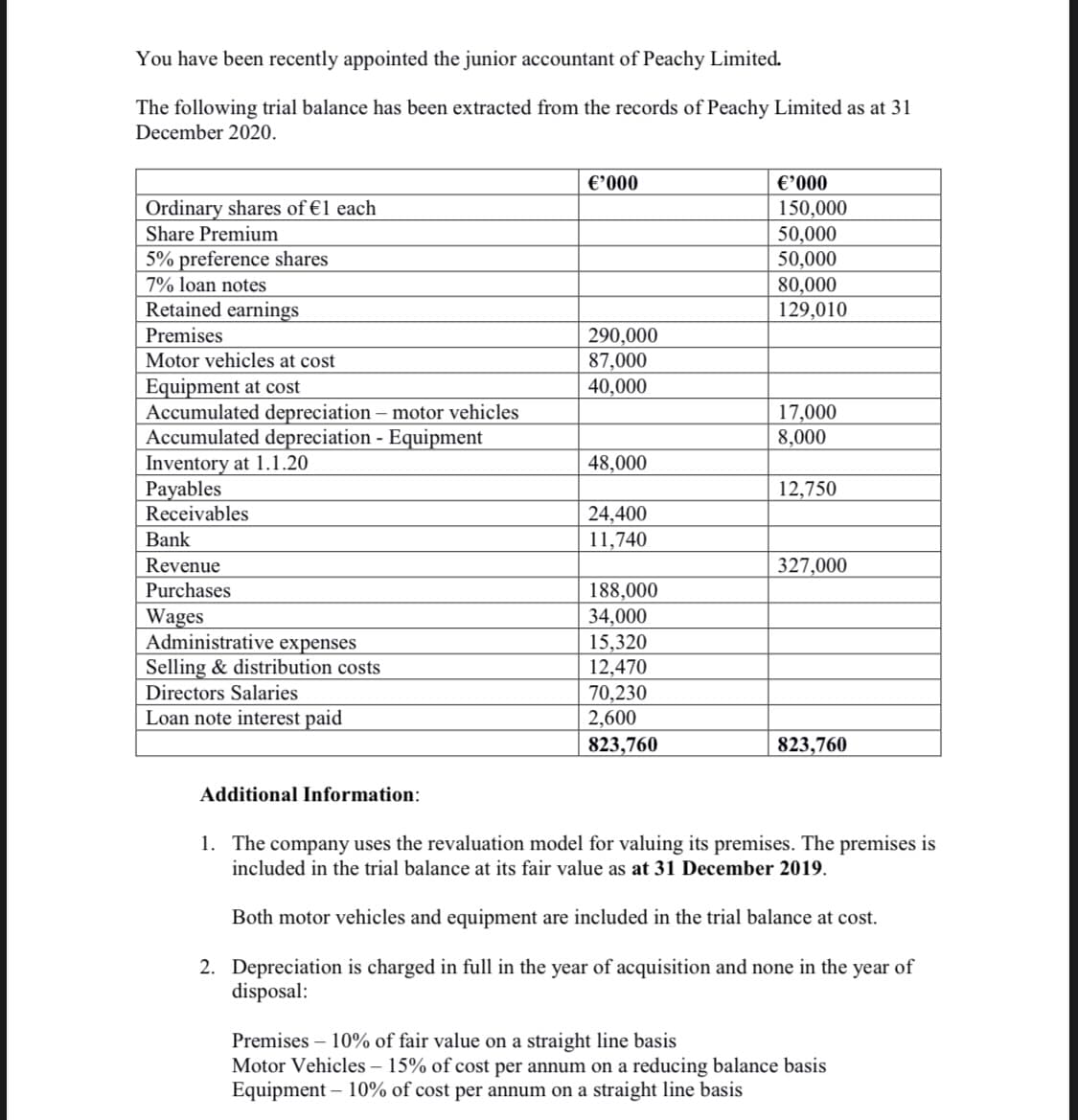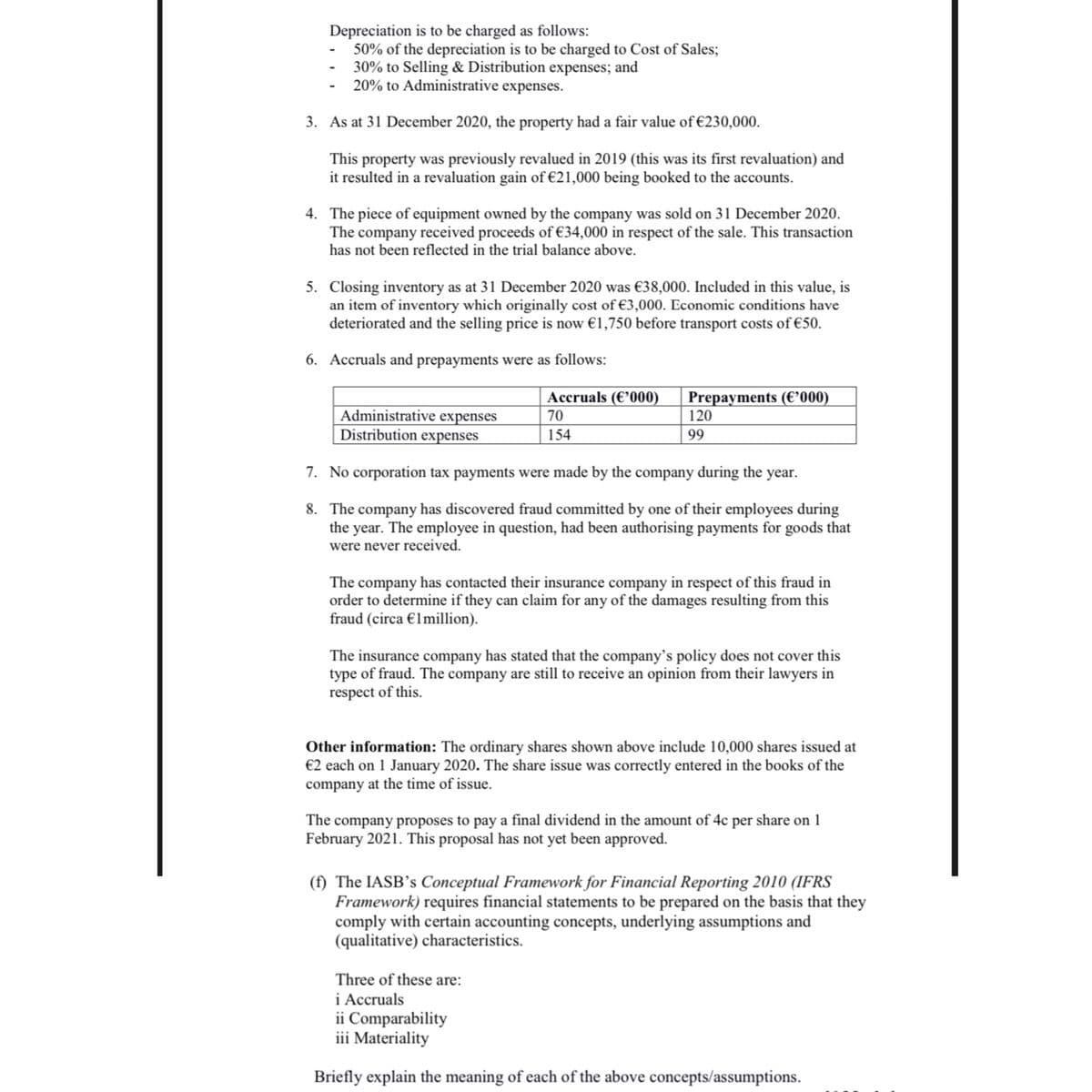(f) The IASB's Conceptual Framework for Financial Reporting 2010 (IFRS Framework) requires financial statements to be prepared on the basis that they comply with certain accounting concepts, underlying assumptions and (qualitative) characteristics. Three of these are: i Accruals ii Comparability iii Materiality Briefly explain the meaning of each of the above concepts/assumptions.
(f) The IASB's Conceptual Framework for Financial Reporting 2010 (IFRS Framework) requires financial statements to be prepared on the basis that they comply with certain accounting concepts, underlying assumptions and (qualitative) characteristics. Three of these are: i Accruals ii Comparability iii Materiality Briefly explain the meaning of each of the above concepts/assumptions.
Intermediate Accounting: Reporting And Analysis
3rd Edition
ISBN:9781337788281
Author:James M. Wahlen, Jefferson P. Jones, Donald Pagach
Publisher:James M. Wahlen, Jefferson P. Jones, Donald Pagach
Chapter15: Contributed Capital
Section: Chapter Questions
Problem 14P
Related questions
Question

Transcribed Image Text:You have been recently appointed the junior accountant of Peachy Limited.
The following trial balance has been extracted from the records of Peachy Limited as at 31
December 2020.
€’000
€'000
Ordinary shares of €1 each
150,000
50,000
50,000
80,000
129,010
Share Premium
5% preference shares
7% loan notes
Retained earnings
Premises
290,000
87,000
40,000
Motor vehicles at cost
Equipment at cost
Accumulated depreciation – motor vehicles
Accumulated depreciation - Equipment
Inventory at 1.1.20
Payables
Receivables
17,000
8,000
48,000
12,750
24,400
Bank
11,740
Revenue
327,000
Purchases
188,000
34,000
Wages
Administrative expenses
Selling & distribution costs
15,320
12,470
70,230
2,600
Directors Salaries
Loan note interest paid
823,760
823,760
Additional Information:
1. The company uses the revaluation model for valuing its premises. The premises is
included in the trial balance at its fair value as at 31 December 2019.
Both motor vehicles and equipment are included in the trial balance at cost.
2. Depreciation is charged in full in the year of acquisition and none in the
disposal:
year
of
Premises – 10% of fair value on a straight line basis
Motor Vehicles – 15% of cost per annum on a reducing balance basis
Equipment – 10% of cost per annum on a straight line basis

Transcribed Image Text:Depreciation is to be charged as follows:
- 50% of the depreciation is to be charged to Cost of Sales;
30% to Selling & Distribution expenses; and
20% to Administrative expenses.
3. As at 31 December 2020, the property had a fair value of €230,000.
This property was previously revalued in 2019 (this was its first revaluation) and
it resulted in a revaluation gain of €21,000 being booked to the accounts.
4. The piece of equipment owned by the company was sold on 31 December 2020.
The company received proceeds of €34,000 in respect of the sale. This transaction
has not been reflected in the trial balance above.
5. Closing inventory as at 31 December 2020 was €38,000. Included in this value, is
an item of inventory which originally cost of €3,000. Economic conditions have
deteriorated and the selling price is now €1,750 before transport costs of €50.
6. Accruals and prepayments were as follows:
Prepayments (€'000)
120
Accruals (€°000)
Administrative expenses
Distribution expenses
70
154
99
7. No corporation tax payments were made by the company during the year.
8. The company has discovered fraud committed by one of their employees during
the year. The employee in question, had been authorising payments for goods that
were never received.
The company has contacted their insurance company in respect of this fraud in
order to determine if they can claim for any of the damages resulting from this
fraud (circa €1million).
The insurance company has stated that the company's policy does not cover this
type of fraud. The company are still to receive an opinion from their lawyers in
respect of this.
Other information: The ordinary shares shown above include 10,000 shares issued at
€2 each on 1 January 2020. The share issue was correctly entered in the books of the
company at the time of issue.
The company proposes to pay a final dividend in the amount of 4c per share on 1
February 2021. This proposal has not yet been approved.
(f) The IASB's Conceptual Framework for Financial Reporting 2010 (IFRS
Framework) requires financial statements to be prepared on the basis that they
comply with certain accounting concepts, underlying assumptions and
(qualitative) characteristics.
Three of these are:
i Accruals
ii Comparability
iii Materiality
Briefly explain the meaning of each of the above concepts/assumptions.
Expert Solution
This question has been solved!
Explore an expertly crafted, step-by-step solution for a thorough understanding of key concepts.
Step by step
Solved in 2 steps

Knowledge Booster
Learn more about
Need a deep-dive on the concept behind this application? Look no further. Learn more about this topic, accounting and related others by exploring similar questions and additional content below.Recommended textbooks for you

Intermediate Accounting: Reporting And Analysis
Accounting
ISBN:
9781337788281
Author:
James M. Wahlen, Jefferson P. Jones, Donald Pagach
Publisher:
Cengage Learning

Cornerstones of Financial Accounting
Accounting
ISBN:
9781337690881
Author:
Jay Rich, Jeff Jones
Publisher:
Cengage Learning

Intermediate Accounting: Reporting And Analysis
Accounting
ISBN:
9781337788281
Author:
James M. Wahlen, Jefferson P. Jones, Donald Pagach
Publisher:
Cengage Learning

Cornerstones of Financial Accounting
Accounting
ISBN:
9781337690881
Author:
Jay Rich, Jeff Jones
Publisher:
Cengage Learning